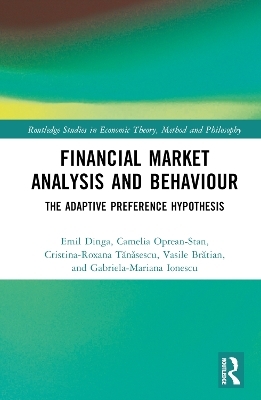
Financial Market Analysis and Behaviour
The Adaptive Preference Hypothesis
Seiten
2022
Routledge (Verlag)
978-1-032-25516-3 (ISBN)
Routledge (Verlag)
978-1-032-25516-3 (ISBN)
This book addresses the functioning of financial markets, in particular the financial market model, and modelling. More specifically, the book provides a model of adaptive preference in the financial market, rather than the model of the adaptive financial market.
This book addresses the functioning of financial markets, in particular the financial market model, and modelling. More specifically, the book provides a model of adaptive preference in the financial market, rather than the model of the adaptive financial market, which is mostly based on Popper's objective propensity for the singular, i.e., unrepeatable, event. As a result, the concept of preference, following Simon's theory of satisficing, is developed in a logical way with the goal of supplying a foundation for a robust theory of adaptive preference in financial market behavior.
The book offers new insights into financial market logic, and psychology: 1) advocating for the priority of behavior over information - in opposition to traditional financial market theories; 2) constructing the processes of (co)evolution adaptive preference-financial market using the concept of fetal reaction norms - between financial market and adaptive preference; 3) presenting a new typology of information in the financial market, aimed at proving point (1) above, as well as edifying an explicative mechanism of the evolutionary nature and behavior of the (real) financial market; 4) presenting sufficient, and necessary, principles or assumptions for developing a theory of adaptive preference in the financial market; and 5) proposing a new interpretation of the pair genotype-phenotype in the financial market model.
The book's distinguishing feature is its research method, which is mainly logically rather than historically or empirically based. As a result, the book is targeted at generating debate about the best and most scientifically beneficial method of approaching, analyzing, and modelling financial markets.
This book addresses the functioning of financial markets, in particular the financial market model, and modelling. More specifically, the book provides a model of adaptive preference in the financial market, rather than the model of the adaptive financial market, which is mostly based on Popper's objective propensity for the singular, i.e., unrepeatable, event. As a result, the concept of preference, following Simon's theory of satisficing, is developed in a logical way with the goal of supplying a foundation for a robust theory of adaptive preference in financial market behavior.
The book offers new insights into financial market logic, and psychology: 1) advocating for the priority of behavior over information - in opposition to traditional financial market theories; 2) constructing the processes of (co)evolution adaptive preference-financial market using the concept of fetal reaction norms - between financial market and adaptive preference; 3) presenting a new typology of information in the financial market, aimed at proving point (1) above, as well as edifying an explicative mechanism of the evolutionary nature and behavior of the (real) financial market; 4) presenting sufficient, and necessary, principles or assumptions for developing a theory of adaptive preference in the financial market; and 5) proposing a new interpretation of the pair genotype-phenotype in the financial market model.
The book's distinguishing feature is its research method, which is mainly logically rather than historically or empirically based. As a result, the book is targeted at generating debate about the best and most scientifically beneficial method of approaching, analyzing, and modelling financial markets.
Emil Dinga is a Senior Researcher at the Centre for Financial and Monetary Research, Romanian Academy, Bucharest, Romania. Camelia Oprean-Stan is a Professor of Finance at the Lucian Blaga University of Sibiu, Romania. Cristina-Roxana Tănăsescu is a Professor of Economic Methodology at the Lucian Blaga University of Sibiu, Romania. Vasile Brătian is an Associate Professor at the Faculty of Economics at the Lucian Blaga University of Sibiu, Romania. Gabriela-Mariana Ionescu is an economist and PhD student in the School of Advanced Studies of the Romanian Academy, Bucharest, Romania.
1. Adaptive Preference 2. Mechanism of Adaptive Preference 3. A (Stylized) Modelling of Adaptive Preference
| Erscheinungsdatum | 30.06.2022 |
|---|---|
| Reihe/Serie | Routledge Studies in Economic Theory, Method and Philosophy |
| Zusatzinfo | 4 Tables, black and white; 57 Line drawings, black and white; 57 Illustrations, black and white |
| Verlagsort | London |
| Sprache | englisch |
| Maße | 156 x 234 mm |
| Gewicht | 620 g |
| Themenwelt | Wirtschaft ► Allgemeines / Lexika |
| Wirtschaft ► Betriebswirtschaft / Management | |
| Wirtschaft ► Volkswirtschaftslehre ► Ökonometrie | |
| ISBN-10 | 1-032-25516-1 / 1032255161 |
| ISBN-13 | 978-1-032-25516-3 / 9781032255163 |
| Zustand | Neuware |
| Informationen gemäß Produktsicherheitsverordnung (GPSR) | |
| Haben Sie eine Frage zum Produkt? |
Mehr entdecken
aus dem Bereich
aus dem Bereich
Übungsaufgaben – Fallstudien – Lösungen
Buch | Softcover (2022)
De Gruyter Oldenbourg (Verlag)
CHF 34,90
mit Aufgaben, Klausuren und Lösungen
Buch | Softcover (2023)
UTB (Verlag)
CHF 34,85
Set aus Lehr- und Arbeitsbuch
Buch | Softcover (2022)
De Gruyter Oldenbourg (Verlag)
CHF 49,95


